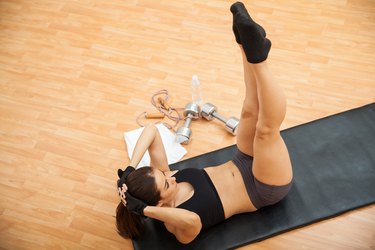
A strong psoas muscle contributes to core strength and helps support your lower back. Strengthening this muscle, which crosses the hip joint from your lower spine to your inner thigh, requires performing psoas muscle exercises through hip or spine flexion on a consistent basis.
Add resistance progressively over a period of weeks and months to maximize your strength. Consult with your doctor before starting a resistance-training program to rule out any conditions or injuries that may adversely affect your health while you lift weights.
Video of the Day
Video of the Day
Read more: Pilates Exercises for the Psoas Muscle
1. Hanging Leg Lifts
Perform hanging leg lifts as one of your psoas muscle exercises using a pull-up bar positioned high enough so your feet can't touch the floor when your legs are fully extended. The psoas muscles contract during the exercise to pull your knees toward your chest and to control the speed of movement as you extend your legs back down.
HOW TO DO IT: Hang from the bar with your hands shoulder-width apart, palms facing forward and feet together. Flex your hips and knees simultaneously, drawing the latter upward as high as possible, then slowly return to the starting position and repeat.
Avoid swinging your legs to build momentum into the upward phase of the exercise. Wear ankle weights to increase the resistance.
2. Leg Throws
The psoas muscles contract eccentrically — while the muscle fibers lengthen — during the leg throws exercise.
HOW TO DO IT: Lie on your back with your legs extended above your waist. Have a partner stand above your head and forcefully push your feet forward. Allow your legs to arc toward the floor in response to the push.
Slow your legs down and stop them before they touch the floor; then lift your legs back up so your partner can push them again. Have your partner push harder to make the exercise more challenging.
3. Lever Hip Flexion
To perform lever hip flexion, you'll need to use a hip flexion machine. The machine has a padded lever that swings in a pendulum-like fashion, and the lever is attached to a stack of weights that you can adjust as desired.
HOW TO DO IT: Stand facing the lever, and place either knee under the lever; grasp the bar that is attached to the top of the machine to stabilize your body. Flex your hip and knee at the same time to swing the lever upward, lifting the stack of weights until your thigh is parallel to the floor.
Slowly return to the starting position. Complete six to 15 repetitions, depending on the amount of resistance, then switch legs.
4. Standing Gate Openers
Like hanging leg lifts and the lever hip flexion exercise, standing gate openers strengthen the psoas muscles through hip flexion and extension ranges of motion. Additionally, the exercise targets the gluteal muscles that lie behind your hip joints.
HOW TO DO IT: Stand with your feet about 6 inches apart and your arms at your sides. Lift your left foot and flex your left knee, drawing it toward your chest. When your thigh is parallel to the floor or higher, move your knee to the right, across the center of your body, and then to the left, opening your hip as far as possible.
Return to the starting position; then repeat with your right leg. Continue alternating sides for your desired number of repetitions. Wear ankle weights for extra resistance.